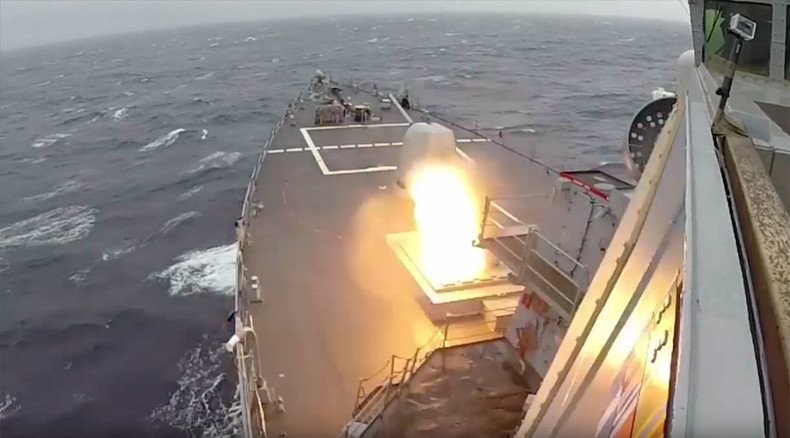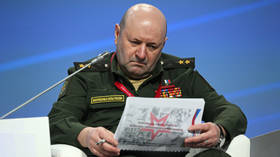First time in Europe: US Navy successfully intercepts missiles during war games (VIDEO)

The US Navy says it has successfully tested its anti-missile defense system during an exercise in Europe, when anti-ship cruise missiles fired from the Scottish coast were shot down by a pair of guided interceptors with the help of tracking from allied ships.
The exercises on Tuesday involved the US Navy and its European allies. A Dutch ship tracked the target and relayed targeting information about the missile to the US naval ship, the USS Ross. A guided missile interceptor built by Raytheon was then fired on the dummy target from the Ross.
“This was the first time a Standard Missile-3 (SM-3) Block IA guided interceptor was fired on a non-US range and the first intercept of a ballistic missile threat in the European theater,” said a US Defense Department press release.
Admiral Mark Ferguson, commander of US Naval Forces Europe-Africa, said the exercise “demonstrated the commitment of the US to the defense of Europe” through its ships and “our shore station in Romania…as well as…our allied sailors.”
Ferguson said the test, carried out by the Maritime Theater Missile Defense Forum, demonstrated the group’s ability to “safely conduct effective coalition sea-based defense against simultaneous anti-ship and ballistic missile threats.”
The sea exercises involved ships from the US, Australia, Canada, France, Germany, Italy, the Netherlands, Norway, Spain and Britain.
Riki Ellison, founder of the Missile Defense Advocacy Alliance, a nonprofit group that advocates for missile defense systems, told Reuters that the successful test means the US Navy can reduce the number of ships it needs for missile defense missions in the Mediterranean by relying on allied ships for threat targeting.
“It is great timing because it demonstrates our capability to track and intercept the kind of missiles that are being fired in and against Syria,” Ellison told Reuters. “It proves that sensors from another country’s ship can be used to give the Navy early warning of potential threats, and those ships can be used to protect American ships.”
Ellison did not indicate to Reuters where the threats to the US might be coming from.
The war games occurred just two weeks after NATO’s secretary-general, Jens Stoltenberg, told reporters that the alliance planned to boost its Response Force by adding two more headquarters in Eastern Europe – in Hungary and Slovakia.
NATO’s Response Force, established in 2003, is comprised of land, air, sea and Special Forces units capable of rapid deployment. It was created to perform a range of tasks, including immediate defense response, crisis management, peace support operations, disaster relief, and protection of critical infrastructure. The NRF can include anywhere from 13,000 to 40,000 military personnel.
NATO to create new HQs in Hungary & Slovakia, boost forces to 40,000 troops – Stoltenberg http://t.co/Xr8U2CTZvH
— Gray State: The Rise (@therisefilm) October 12, 2015Stoltenberg called the current reinforcement the biggest “since the end of the Cold War” and said they had already set up six small headquarters in Eastern Europe.
Russia, however, considers NATO’s expansion hostile and destabilizing, and has repeatedly criticized what it describes as a military buildup near its borders. Moscow has also criticized plans to continue with the missile defense system after a deal with Iran over its nuclear agreement was finalized, seeing as the US had said the missile defense system was intended to contain that country.
“We don’t see any reasons [the missile defense system] should continue, especially at such a rapid pace and with a clear ‘projection’ on Russian territory,” Russian Deputy Foreign Minister Sergey Ryabkov said in August, adding that “the US administration is making up artificial excuses to justify their decision – made under the influence of other motives – to continue the creation of a missile defense system in Europe.”
The US has denied that its program is aimed at Moscow.
LISTEN MORE:












